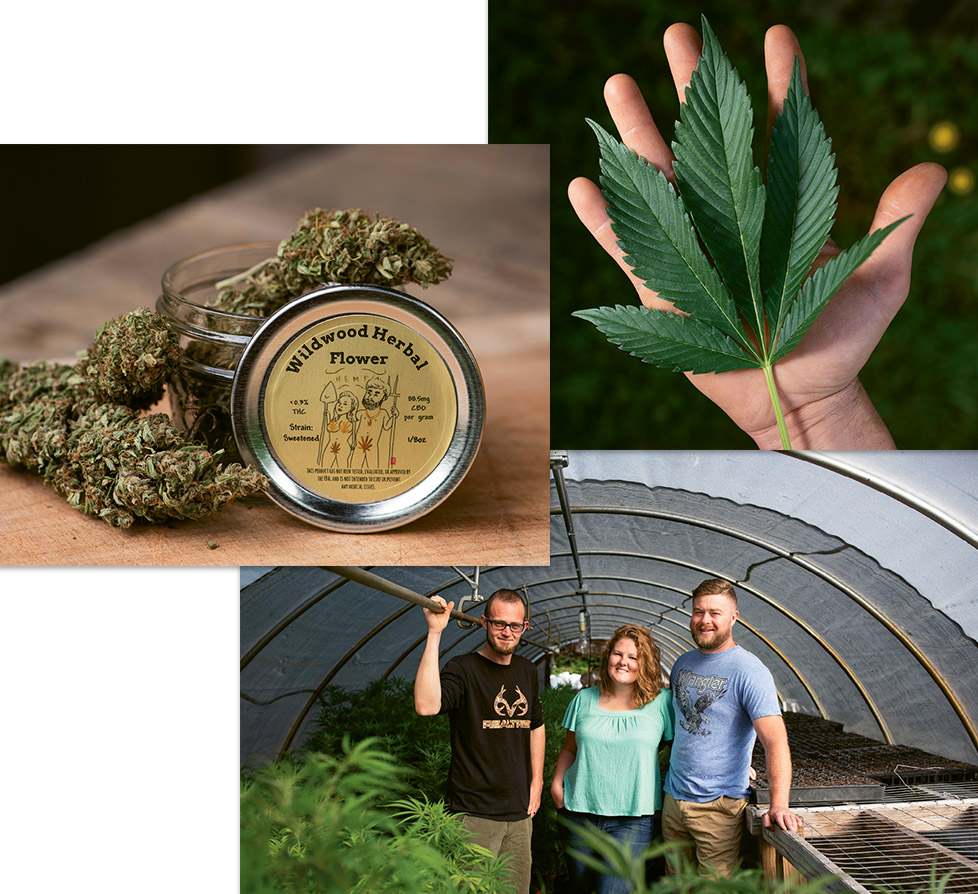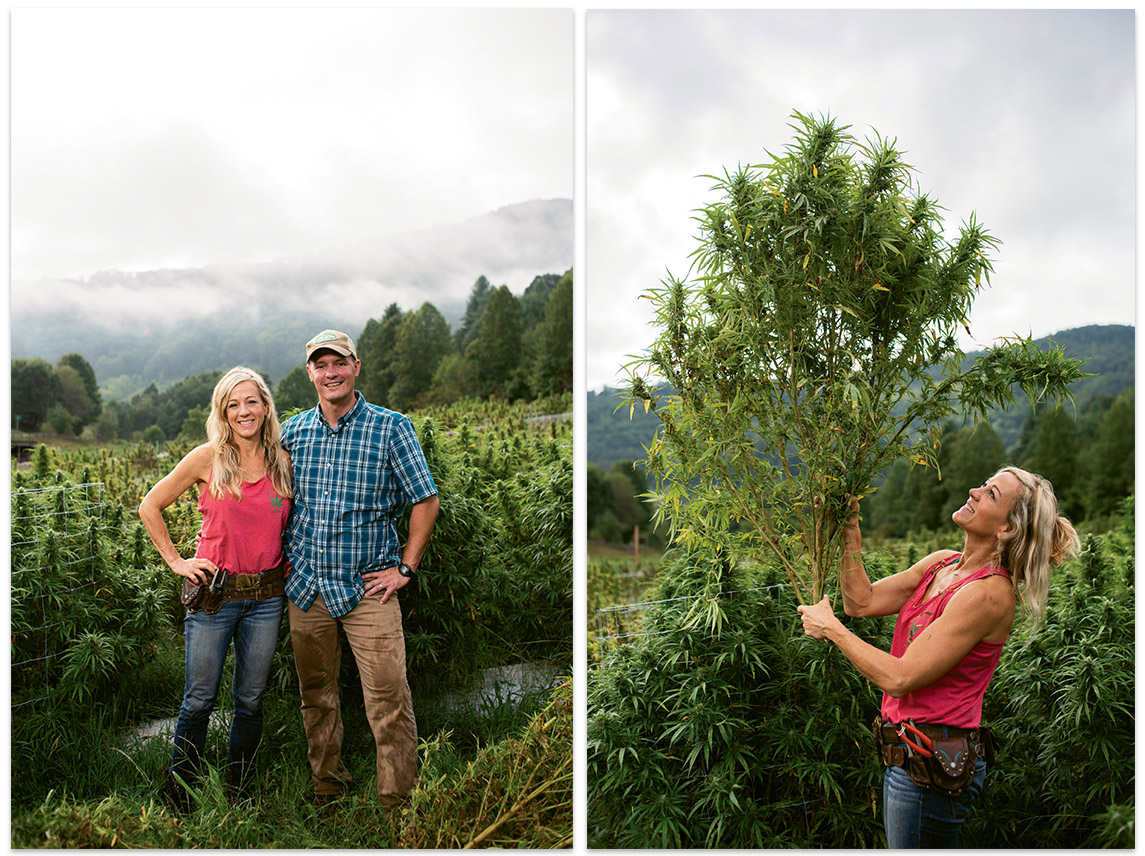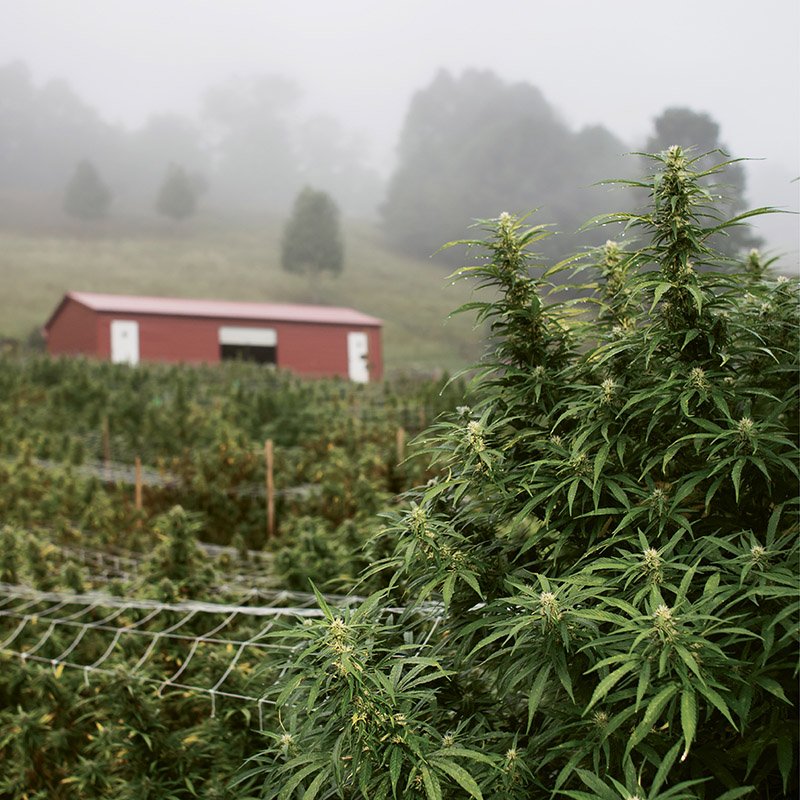The Green Rush
The Green Rush: A long-banned plant could spark a surge in post-tobacco mountain agriculture
Franny’s Farm in Buncombe County, one of the first in the area to transition in part to growing industrial hemp
In the Reems Creek valley just 15 minutes from downtown Asheville, Justin Fisher summons one of his most treasured memories. Here, he worked with his grandfather in a field of knee-high burley tobacco, rooted in the rich soil of the cove that generations of his family, the Branks and Fishers, have farmed for two centuries. In his lifetime, the slender 29-year-old, who’s sporting a mod set of black-rimmed glasses and Abe Lincoln-style whiskers, has seen tobacco replaced by alfalfa and other more lucrative commodities.
Now, he’s facing a sprawling flatland wedged between the road and Reems Creek where alfalfa has not been planted this season. Fisher tilled a portion of the field—10 acres, to be precise—and this summer, he and his partners, Darsey Driver and her husband Seth Salmon, are growing what could become the next generation of cash crop in this historic agricultural region, one that would have been unthinkable just a few years ago.

At Wildwood Herbal Plants and Produce, just north of Asheville, hemp is increasingly the focus. Partners Justin Fisher, Darsey Driver, and Seth Salmon produce products like their branded hemp flower (above left), which they sell at tailgate markets.
New Leaf in Town
In 2017, the North Carolina General Assembly permitted the use of the crop that was once cultivated by George Washington and Thomas Jefferson but had been criminalized for decades: hemp (not to be confused with its psychoactive cousin, marijuana). Last year, Fisher planted an acre of it below Branks Mountain, tapping into his knowledge of harvesting and curing tobacco. Then, he sold the hemp to a processor who extracted its valuable oil.
Fisher’s agricultural roots have proven a perfect match for Driver and Salmon. Seven years ago, the couple took the helm of Wildwood Herbal Plants and Produce, Salmon’s family’s indoor organic farming operation near where he was raised and just upstream from Fisher’s farm. Since then, they have sustained a thriving enterprise providing herbs and vegetables to local farmers markets, restaurants, co-ops, and supermarkets. This year, however, most of their indoor growing space is devoted to hemp.
Fisher’s patch of valley is currently awash with the green, skinny-leafed plants that were transplanted from Salmon’s greenhouses. And rather suddenly, the ancient plant—cultivated since the dawn of civilization—has sprouted into something that’s bigger than anticipated. Although North Carolina is still the nation’s largest tobacco producer, in 2004, the federal government ended the tobacco quota system that controlled supply. Prices plummeted, and mountain growers largely quit planting.

Above, Justin Fisher prunes hemp plants in a greenhouse at Wildwood Herbal Plants and Produce. They’ll eventually be transplanted to Fisher’s fields nearby, which, until recently, were premium hayfields.
The collaboration between Fisher, Driver, and Salmon, with their blend of the past and future of WNC agricultural practices, may explain why mountain farmers, scientists, and entrepreneurs have lofty expectations for the utilitarian plant. Hemp has proven its use in goods as varied as snacks, skin creams, paper, building materials, dietary supplements, pale ales, and T-shirts, to name just a few.

Growing Interest
North Carolina State University extension specialist Jeanine Davis, who’s based at the Mountain Horticultural Crops Research and Extension Center in Mills River, concentrates on helping farmers with new and emerging crops such as ramps, truffles, and ginseng. But she hasn’t seen this level of commotion for a crop in her three-decade career.
“What has been different with hemp is that the level of enthusiasm exceeds anything I have looked at,” says Davis. “Hops was the next closest thing, but the excitement for hemp has 100 times the level of interest.” Davis says that she’s heard from everyone from back-to-earth entrepreneurs in tie-dyes to salt-of-the-earth farmers about their interest in raising hemp.
According to Davis, the traditional farming know-how in Reems Creek and other pockets of the Carolina mountains is well-suited for success with the plant. “Farmers here have been dealing with mold and diseases their whole lives,” she notes. “They understand the weather and how the land has been used.” On the other hand, hemp entrepreneurs bring in knowledge about hemp’s unique chemistry and how to promote its applications. “If you can get these two groups talking and sharing,” says Davis, “we can make progress really quickly.”
Davis thinks a combination of circumstances may have contributed to the explosion of curiosity in industrial hemp. For one, she says, the last two years of mountain farming have faced trials. On top of volatile commodity prices, excessive rain and damp conditions have added to the havoc of living off the land in our region. It is, therefore, perfectly logical that struggling farmers and get-rich-quick prospectors are charmed by the testimonies of grand hemp harvests and tremendous profits—though estimates of what’s to come might be inflated.

In the retail space at Carolina Hemp Company in Asheville (above), the increasingly popular hemp extract oil rich in CBD and smokable flower are sold alongside a range of other hemp-based products.
As a matter of fact, Davis advises, don’t cash in your 401(k) and plunge into hemp farming just yet. The new industry is as fresh as a just-baked loaf of bread and full of peril. “My standard line is, don’t invest more than you can afford to lose,” she says, noting that no single crop can save farming. At the same time, Davis believes hemp has serious promise and might fit well in the region’s landscape, climate, and tobacco heritage. “I’ve spoken with growers that don’t know if they can stay in farming. They are looking for something new and different,” she says. “Hemp offers hope.”

“I do think hemp is the future of small-scale farming in the western part of the state, but it will require people who are willing to take risks.” —Blake Butler, Executive Director, North Carolina Industrial Hemp Association
Oil in These Hills?
Carolina Hemp Company’s dispensary on Asheville’s hip west side offers evidence that this might be one of the most versatile members of the plant kingdom.
“If we had to abandon the planet and you get to take one plant with you, hemp would be number one on the list because it provides so much,” says Carolina Hemp CEO Randall Snyder. Founded by Brian Bullman in 2014, the enterprise has 22 employees and distributes hemp-made merchandise throughout the US. The retail space stocks twine, textiles, soda, pet food, chocolate, and coffee—all made with hemp. Their most sought-after products, however, are the vials of hemp extract oil.
The recommended dose of a quarter milliliter is dribbled below the tongue, and within seconds, the earthy flavor of the compound gently occupies your palate; in its wake, a remote aftertaste. The impact of the droplet, says Snyder, is long-lasting, and he believes that the oil’s source is among the most useful crops lavished on humankind. After all, what other plant can you wear, toss in a salad, use to erect a house, or fuel an automobile?
“Our first objective is to teach and inform,” says Snyder. “This plant is supposed to be part of our everyday life, so we want people to come in and touch it, sniff it, and taste it.”

While hemp can be refined as a grain or fiber, nearly all of the hemp raised in Western North Carolina last year was processed into cannabidiol, better known as CBD oil. Advocates say that it’s a miracle substance that can relieve anxiety and chronic pain, aid digestion, and provide effective therapy for epilepsy and MS, among other touted benefits. But while mom and pop CBD shops have sprouted up across the state in the last year or two, the real boom may be fueled by big-box retailers, big pharma, and a range of national brands. A recent estimate by the Brightfield Group, a firm that analyzes the cannabis industry, says the American CBD market will exceed $20 billion by 2022. So it may not be long before many of us are sipping lattes with a splash of cannabis and guzzling cannabidiol colas.
Carolina Hemp’s CBD brand, Kingdom Harvest, uses locally sourced hemp and is processed in Biltmore Village. “It’s the first vertically integrated hemp extract product produced since prohibition,” boasts Snyder, though the prohibition he’s talking about isn’t the ban on booze. He’s referring instead to the Marihuana Tax Act of 1937, which criminalized industrial hemp; in the early ’70s, it was labeled a “schedule 1” banned substance in the same league as LSD and heroin. And yes, even though you can inhale hemp (smokable flower buds and vape oil are also among Carolina Hemp’s top-selling products), you won’t get “baked.” Mostly absent from industrial hemp is THC, the mind-altering chemical that’s found in relatively high concentrations in marijuana.
The ban on industrial hemp began to unravel in 2014, when Congress passed legislation authorizing departments of agriculture and institutions of higher eduction in states that had legalized hemp cultivation to regulate and conduct research of the plant. The following year, the North Carolina General Assembly established the Industrial Hemp Pilot Program, which has led to the development of rules and regulations governing hemp production.
That’s about when Blake Butler, executive director of the North Carolina Industrial Hemp Association, turned his attention to the plant. A partner in an Asheville-based public relations firm, Butler took a call from an out-of-state company distributing a CBD energy drink. Their containers were branded with the pointy five-fingered cannabis plant, and the sheriff kept pulling it from the shelves, convinced it contained marijuana.
“That began my quest to find out more about how CBD could be carried and marketed,” Butler says. “Since then, we’ve been trying to connect the dots to understand how hemp can be advantageous for North Carolina.” Following hemp’s legalization, the biggest hurdle has been uprooting its stigma. “People thought we were trying to legalize marijuana. My parents thought I was a drug dealer,” laughs Butler, who represents not only retailers but growers, insurance companies, banks, and players at every level of the supply chain.
Butler has since played a central role in guiding the regulatory framework that will oversee the marketplace. In February 2017, the state adopted rules that allowed growers to begin planting, and made hemp and CBD an agricultural commodity. But the big surge in production is happening this year. Congress’ Agricultural Improvement Act of 2018, better known as the 2018 Farm Bill, allowed for the transfer of hemp-derived products across state lines and placed no restrictions on the sale, transport, or possession of hemp products. Still, there are sobering rules: for instance, hemp is limited to containing 0.3 percent THC, and that negligible trace can be a tricky target for growers since the intoxicating chemical can be found in small doses in industrial hemp and can be influenced by a range of factors that may be beyond the control or knowledge of a grower.
Fortunately for potential local growers, according to Butler, North Carolina has among the most friendly regulations relative to other states that are high on the plant’s future, such as Kentucky, Oregon, and Georgia. Later this year, the state will submit its pilot program to the US Department of Agriculture for review, and soon, Butler envisions a heyday when North Carolina becomes known as the hemp state.

Along with about 100 volunteers, Frances and Jeff Tacy of Franny’s Farm (left) hand harvest and process a half acre of hemp each September, which involves trimming, drying, and curing.
Promise and Peril
Despite the rapid progress, there are still plenty of snags ahead before interstates 40 or 26 will be lined with abundant rows of hemp, or the state seal will be rebranded with Lady Plenty extending the up-and-coming plant to Lady Liberty (she’s been grasping three heads of another grain since 1778).
“Now it’s all about figuring out a sustainable formula,” says Butler. “I do think hemp is the future of small-scale farming in the western part of the state, but it will require people who are willing to take risks.”
One of those gutsy growers is Frances Tacy, the first female hemp planter in the state. A former special ed teacher and pharmaceutical rep, she and her husband, Jeff, started Franny’s Farm in Leicester in 2012 and planted their first hemp crop in 2017, following legalization.
“Imagine the gold rush movies in the Wild West and you have a decent insight into what the hemp industry is like,” says Tacy. Among the challenges are uncertainty regarding the weather, pests, future regulations, labor needs, access to credit, and finding buyers for their product. In fact, the industry is sprouting so rapidly that bottlenecks in the supply chain have developed for processing and drying. On top of that, harvesting technology has yet to scale up to the levels producers need to become more productive and profitable.

(Left) A volunteer “cleans” dried hemp by removing the stalks and stems. (Right) What remains will be made into tinctures and body products branded and sold through Franny’s Farmacy.
While much of that risk is anchored to the grower, there’s a sparkling upside, and Tacy’s gambled her life savings on it. She anticipates that there will be a hemp-growing boom in 2019 and “agriculture-based economic opportunities like our country has never seen before.” To ease the gamble, she’s aligned with strategic partners and has vertically integrated her operation from seed to retail. Currently, she owns four hemp dispensaries and has plans for a fifth as well as franchise opportunities.
Both Tacy and Butler say they take dozens of calls each day from entrepreneurs and farmers eager to grab a piece of the hemp pie. Despite their bullish view of hemp’s future, “it’s not a field of dreams,” Butler warns. “There’s no blueprint on how to reintroduce hemp; we’re writing that book now. But something like this hasn’t come along in a long time for North Carolina.”
Indeed, farming has often been a precarious means of eking out a living in the mountains. Though hemp may be the cool crop to sow at present, from the point of view of planters such as Fisher and Salmon, hemp is a practical solution, as it could help safeguard Reems Creek’s farming tradition. And the timing is right too, as cultural concerns and confusion about the legality of hemp are starting to fade as word spreads of its potential economic impact here.
Into the Weeds
Learn more about the Industrial Hemp Pilot Program in North Carolina at www.ncagr.gov/hemp, and stay abreast of the state's thriving hemp industry and find growers through the NC Industrial Hemp Association at www.ncindhemp.org.
